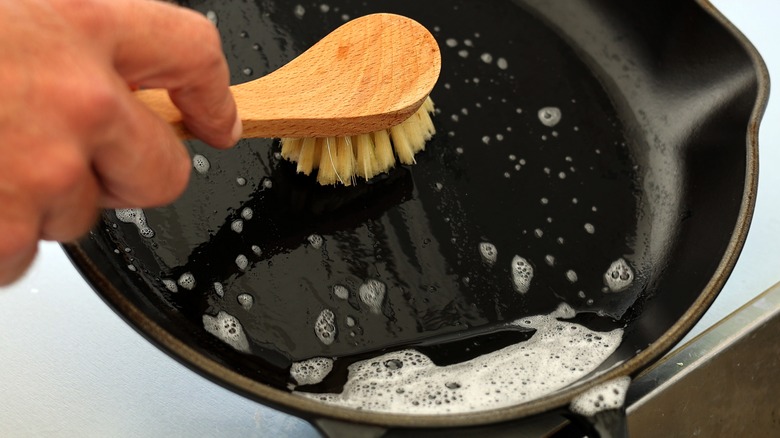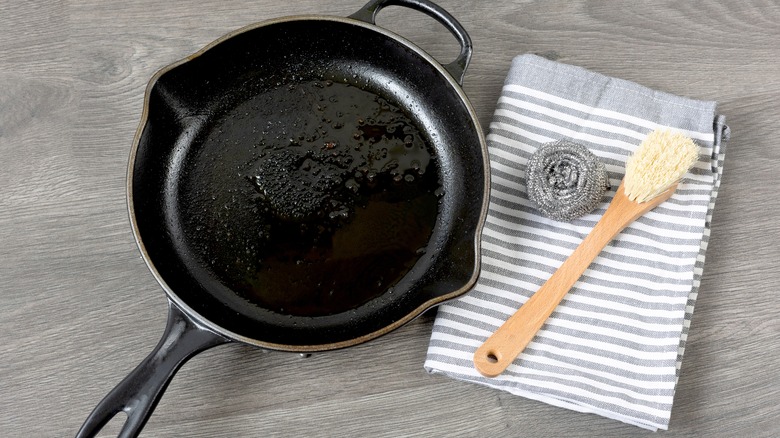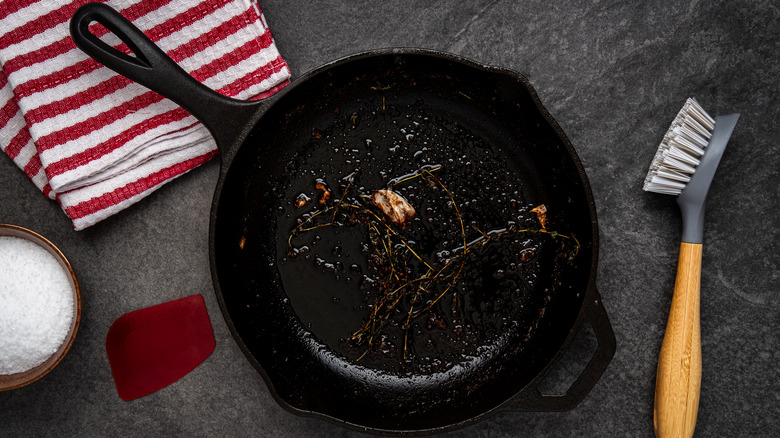Is It Okay To Clean Cast Iron Skillets With Soap?
A bit of dish soap and a sponge may do an effective job of cleaning most kitchen items, but there are times where they aren't the best. For example, the acid in soap can damage fragile china, countertops made of natural stone, and utensils with copper or brass coating. There's a decades-old adage that cast iron cookware falls squarely in the same category, with some cooks swearing that a drop of soap will ruin the pan forever, but this time, you might have to ignore grandma's advice. You can absolutely use dish soap to clean cast iron skillets — both plain and enameled ones — as long as you keep a few things in mind.
The reason why generations of cooks have sworn off soap for their cast iron cookware is because dish soap used to contain harsh ingredients like vinegar and lye, which can definitely compromise the seasoning of your pan and even ruin its surface altogether. Back in the day, most soaps contained abrasive components like these, but popular modern brands are much gentler, and do a fine job of cleaning cast iron without damaging it in the process.
As long as you pick a mild, eco-friendly, and fragrance-free product — and stay away from anything that contains vinegar, lye, or sodium hydroxide — using soap will be a cast iron hack you wish you knew sooner. Combine it with the right tools, and your pans will be clean as a whistle and residue-free.
What to know about cleaning cast iron pans with soap
You can take short or long ways of cleaning cast iron pans, whether you want a quick clean or a deep, thorough job. Soap can definitely be both fast and effective, especially when paired with a good scrubber. If there's stubborn grime on the pan that won't come off with a sponge, brush, or gentle chainmail scrubber, pour some water into the pan and heat it to loosen up the gunk, then try cleaning it again with soap. To avoid the extra hassle, consider working with the pan while it's still slightly warm from the stove — that's when the gunk will be more pliable.
Another thing to keep in mind is that while soap is okay, contact with water can damage your pans. Don't let your pans soak in water for longer than necessary, and dry them properly with a towel after. Even a little bit of lingering moisture can cause rust on cast iron. After soaking, try heating the empty pan on the stove until you're sure that all the water has evaporated.
Once you're done, enamel-coated cast iron pans will be ready to be put away just as they are. Plain ones, on the other hand, will have to be re-seasoned. A little dish soap isn't going to strip off the many layers of oil polymerized into your cast iron, but seasoning it again never hurts. Just half a teaspoon of oil should be enough for the job.
Other ways to clean cast iron cookware
Though soap is okay to use on cast iron skillets, you may not always need it. Your cleaning method mainly depends on what you've cooked in the pan. Crumbs from dry ingredients, like crunchy bread loaves baked in cast iron, can just be wiped away with a towel, whereas fat and grease from searing foods will come off with hot water. When you cook something saucy — or want to make sure that the flavor of what you've cooked doesn't seep into your next meal — soap can definitely be useful to get rid of residue and lingering aromas.
If you're still wary of using soap, salt can be an effective way of cleaning your skillet. Though soap does a great job, salt can help the pan retain its protective patina much better, and it doesn't need to be seasoned as thoroughly afterward. To try it, coat the pan with coarse kosher salt before buffing the vessel gently with a paper towel or other tool. If the food residue won't budge, warm up the pan with the salt still in it and try again.
You could even use half of a potato as a scrubber paired with salt. Spuds contain oxalic acid, a popular ingredient in most commercial cleaners, making for an all-natural cleaning boost. No matter what you do, though, never use an abrasive scrubber made from steel, metal, or wool — these will damage your skillets faster than any soap or water would.



